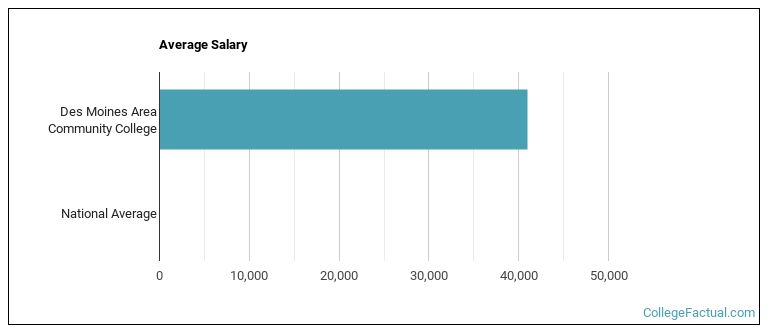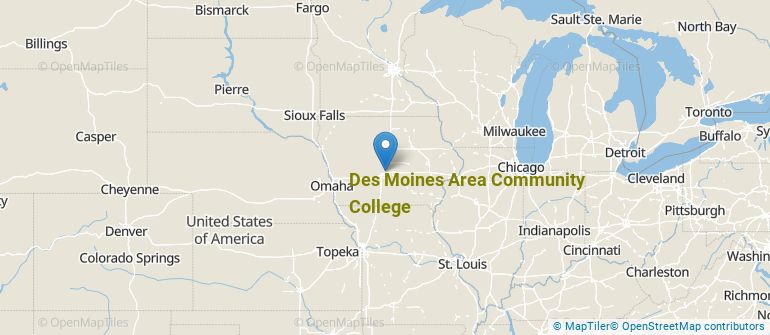 by our College Data Analytics Team
by our College Data Analytics Team
In its yearly rankings, College Factual analyzes over 2,000 colleges and universities to determine which ones are the best in a variety of categories, such as overall value, quality, diversity, which schools are the best for each major, and much more.
Des Moines Area Community College was awarded 52 badges in the 2025 rankings. The highest ranked major at the school is computer programming.
Explore the best ranked schools for the programs you are most interested in.
College Factual ranked DMACC as #408 out of 2,152 colleges and universities in the country on its 2025 Best Colleges list. This puts it in the top 20% of all schools in the nation. This is an improvement over the previous year, when DMACC held the #501 spot on the Best Overall Colleges list.
Out of the 37 colleges in Iowa, DMACC is ranked at #6.
See all of the rankings for Des Moines Area Community College.
Des Moines Area Community College has an open admissions policy, so you should not have much trouble being accepted by the school. Still, it is important to fill out the application completely and submit any requested materials, which may include proof that you have a high school diploma or the equivalent.
The student to faculty ratio is often used as a measure to gauge how much access students will have to their professors - the lower the number, the better. At Des Moines Area Community College, this rate is 19 to 1, which is high when compared to the national average of 15 to 1.
When estimating how much access students will have to their teachers, some people like to look at what percentage of faculty members are full time. This is because part-time teachers may not have as much time to spend on campus as their full-time counterparts.
The full-time faculty percentage at Des Moines Area Community College is 100%. This is higher than the national average of 47%.
The freshmen retention rate tells us what percentage of first-year, full-time students choose to continue on to their sophomore year at a particular school. The rate at Des Moines Area Community College is 63%, which is about average when compared to the national rate of 68%.
During the 2017-2018 academic year, there were 23,051 undergraduates at DMACC with 5,703 being full-time and 17,348 being part-time.
| $0-30 K | $30K-48K | $48-75 | $75-110K | $110K + |
|---|---|---|---|---|
| $8,071 | $8,831 | $10,656 | $13,314 | $13,736 |
The net price is calculated by adding tuition, room, board and other costs and subtracting financial aid.Note that the net price is typically less than the published for a school. For more information on the sticker price of DMACC, see our tuition and fees and room and board pages.
While almost two-thirds of students nationwide take out loans to pay for college, the percentage may be quite different for the school you plan on attending. At DMACC, approximately 29% of students took out student loans averaging $4,839 a year. That adds up to $19,356 over four years for those students.
Get more details about paying for Des Moines Area Community College.

See which majors at Des Moines Area Community College make the most money.
Get more details about the location of Des Moines Area Community College.

Contact details for DMACC are given below.
| Contact Details | |
|---|---|
| Address: | 2006 Ankeny Blvd, Ankeny, IA 50023-3993 |
| Phone: | 515-964-6200 |
| Website: | https://www.dmacc.edu/ |
| Most Popular Majors | Bachelor’s Degrees | Average Salary of Graduates |
|---|---|---|
| Liberal Arts General Studies | 1,002 | NA |
| Practical Nursing & Nursing Assistants | 534 | NA |
| Homeland Security | 332 | NA |
| Precision Metal Working | 296 | NA |
| Nursing | 178 | NA |
| Computer Programming | 159 | NA |
| Allied Health Professions | 133 | NA |
| Vehicle Maintenance & Repair | 132 | NA |
| Accounting | 124 | NA |
| Agricultural Economics & Business | 90 | NA |
Online courses area a great option for busy, working students as well as for those who have scheduling conflicts and want to study on their own time. As time goes by, expect to see more and more online learning options become available.
In 2022-2023, 9,690 students took at least one online class at Des Moines Area Community College. This is a decrease from the 10,251 students who took online classes the previous year.
| Year | Took at Least One Online Class | Took All Classes Online |
|---|---|---|
| 2022-2023 | 9,690 | 5,265 |
| 2021-2022 | 10,251 | 5,710 |
| 2020-2021 | 14,538 | 11,766 |
| 2018-2019 | 7,141 | 3,589 |
Learn more about online learning at Des Moines Area Community College.
Footnotes
*The racial-ethnic minorities count is calculated by taking the total number of students and subtracting white students, international students, and students whose race/ethnicity was unknown. This number is then divided by the total number of students at the school to obtain the racial-ethnic minorities percentage.
References
More about our data sources and methodologies.